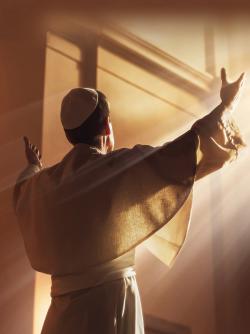The Miraculous American Revolution
Many say, “God Bless America,” but the true blessings may go deeper than many realize. What is God’s prophetic purpose for guiding the rise of the United States?
Though secular historians scoff at the idea, students of the Bible recognize that God guides the course of history. Long ago, Job wrote that “He makes nations great, and destroys them; He enlarges nations, and guides them” (Job 12:23–24). The prophet Daniel records the same important message—that God “removes kings and raises up kings” and “the Most High rules in the kingdom of men, and gives it to whomever He will” (Daniel 2:21; 4:17, 25, 32; 5:21).
So, did God intervene to guide the outcome of the American Revolution? A quick survey of the facts will reveal that indeed, He did. In this brief article, we will consider just a few of His miraculous interventions—and you may want to study more of them on your own.
George Washington’s Amazing Survival
American General George Washington played a leading role in the American Revolution and the nation’s founding. His solid character and firm convictions were key factors in molding the nature and outlook of America. But his very survival to lead the nation was not at all assured.
In 1755, a 23-year-old Colonel Washington was one of 1,400 British troops fighting under the command of General Braddock in the French and Indian War, battling to capture Fort Duquesne, near Pittsburgh. During the battle, they were attacked by a French and Indian force. “Braddock was killed and every officer on horseback was shot, except Washington.” The young colonel later wrote to his brother, “But by the All-Powerful Dispensations of Providence, I have been protected beyond all human probability or expectation; for I had four bullets through my coat, and two horses shot under me, yet escaped unhurt, although death was leveling my companions on every side of me.” A Native American who fought in the battle later stated, “Washington was never born to be killed by a bullet! I had seventeen fair fires at him with my rifle and after all could not bring him to the ground” (Susie and William Federer, Miracles in American History, pp. 17–19).
How Did the Weather Help the American Revolution?
In the summer of 1776, General Howe had a British force of more than 400 ships and 32,000 troops stationed around Staten Island in New York Harbor. General Washington gathered about 8,000 American troops at Brooklyn Heights on the western edge of Long Island. The British were able to land about 15,000 troops behind Washington’s lines and inflict heavy losses on the Americans, who were encircled with their backs to the East River.
However, the weather proved to be a deciding factor. Strong winds, an ebbing tide, and incessant rain kept the British from further attacks on the American position, and from moving their warships into the East River to cut off an escape route. Washington, realizing the danger of his position, ordered a nighttime evacuation of Long Island. That evening, at about 11:00 p.m., the wind died down and a thick fog developed, shrouding the American evacuation—and when the fog lifted later the next morning, the British were surprised to find that the American soldiers were nowhere to be found (Chris and Ted Stewart, Seven Miracles That Saved America, pp. 9–11). One American soldier wrote, “Providentially for us, a great fog arose, which prevented the enemy from seeing our retreat” (David Ludlum, The Weather Factor, pp. 36–37).
The outcome of this battle has been described as “so astonishing that many (including General Washington) attributed the safe retreat of the American army to the hand of God” (Mark Beliles and Stephen McDowell, America’s Providential History, pp. 158–161). If the wind, rain, and the fog—termed the “heavenly messenger”—had not intervened for the Americans, they would have been captured, Washington would have been hanged, and the revolution would have come to an early end.
In December, 1776, with morale low and Washington’s army dwindled to about 2,000 at Valley Forge, Washington decided to cross the ice-filled Delaware River and launch a surprise attack on the British in Trenton, New Jersey. The Americans attacked at sunrise on December 26 during a driving snowstorm, with the wind at their backs and blowing into the faces of the mercenary Hessian troops. In less than an hour, the Americans captured nearly a thousand Hessians and lost only a few men. Artillery officer Henry Knox wrote of the victory at Trenton: “Providence seemed to have smiled on every part of this enterprise” (Beliles and McDowell, pp. 161–162).
Burgoyne’s Defeat and Benedict Arnold’s Plot Revealed
Another crucial turning point occurred in the summer of 1777. British General John Burgoyne was marching down the Hudson River Valley from Canada with a force of 7,000 men to join General Howe, who was supposed to be marching north to Albany, New York. However, Burgoyne was stopped at Saratoga by a force of more than 15,000 Americans angered by the brutality inflicted by Burgoyne’s Native American allies. Failing to defeat the Americans, Burgoyne and his troops began a retreat, only to be caught in a rainstorm that turned the roads into a muddy bog. When the Americans crossed the Hudson River ahead of him and blocked his escape, Burgoyne and 6,000 of his troops surrendered.
General Howe never made the trip up the Hudson, as his reinforcements and supplies coming from England were delayed by contrary winds. The defeat of one of Britain’s best generals was a shock to London, but it was viewed as a “miracle” in Paris—a turning point in the Revolutionary War that brought France into the conflict on the side of the Americans (William Weir, 50 Battles that Changed the World, pp. 55–59). Washington wrote of this event, “I most devoutly congratulate my country, and every well-wisher to the cause, on this signal stroke of Providence,” and Roger Sherman, a signer of the Declaration of Independence, wrote, “This is the Lord’s doing, and marvelous in our eyes” (Federer, pp. 55–57).
In the fall of 1780, the traitorous action of General Benedict Arnold, the hero of the Battle of Saratoga, was discovered by a surprising turn of events. Arnold was plotting to turn the American garrison at West Point, a key position for the control of the Hudson River, over to the British in return for a payment of 20,000 pounds—about a million dollars in today’s money. American sentries happened to stop Major John Andre, dressed as a civilian, as he attempted to return to British lines. In a hollow space in his boot, they found a map of West Point and details of an impending attack. The unexpected apprehension of Major Andre and the discovery of Benedict Arnold’s treachery was widely viewed as an act of “Divine Protection” (Beliles & McDowell, pp. 163–165). Yale President Ezra Stiles wrote in 1873, “A providential miracle detected the conspiracy of Arnold…. [T]he body of the American army, then at West Point, with his excellency General Washington himself, were to have been rendered into the hands of the enemy” (Federer, pp. 63–66).
Rising Rivers, Strong Storms, and a Sudden Squall
In January 1781, American General Daniel Morgan defeated an advancing British force under General Cornwallis at the Battle of Cowpens in South Carolina in what has been called a “tactical masterpiece and turning point of the war” (Federer, p. 67). Morgan retreated north, chased by the British. Cornwallis reached the Catawba River only hours after the Americans had crossed, “but a sudden storm made the river impassable…. [T]he British nearly overtook the Americans at the Yadkin River, but again rains flooded the river slowing the British” and “another flash flood blocked the British” at the Dan River—allowing the Americans to cross into friendly territory in Virginia. British General Henry Clinton described these events as follows: “Here the royal Army was again stopped by a sudden rise of the waters, which had only just fallen (almost miraculously) to let the enemy over” (Federer, pp. 67–68). George Washington wrote in March of 1781, “We have abundant reasons to thank Providence for its many favorable interpositions in our behalf. It has at times been my only dependence, for all other resources seemed to have failed us” (Federer, p. 69).
The culminating battles of the Revolutionary War were also decisively influenced by the weather. In October of 1781, an inconclusive engagement between the French and British fleets in the Atlantic, prolonged by shifting winds, allowed another squadron of French ships with troops and supplies to slip into the Chesapeake Bay—preventing British supply ships from reaching Cornwallis, who was surrounded by 17,000 French and American troops in Yorktown. Facing overwhelming odds, Cornwallis attempted a nighttime breakout by starting to ferry his regular troops across the York River. The first group made it safely across. However, a sudden and severe rain squall blew the second contingent of soldiers downriver, leaving Cornwallis with a much-reduced force.
This sudden “adverse turn of the weather completely disrupted the attempted breakout” and as a British colonel commented, “Thus expired the last hope of the British army” (Ludlum, pp. 59–64). Cornwallis surrendered the next day, while a British military band played “The World Turned Upside Down.” The American victory at Yorktown has been called one of the most influential battles in history, as it ended an eight-year struggle for independence and launched America on a path to becoming a world power (Michael Lanning, The Battle 100, pp. 1–4)—and it was aided by a sudden and dramatic change in the weather.
After the pivotal Battle of Yorktown, Yale President Ezra Stiles wrote, “Who but God could have ordained the critical arrival of the Gallic [French] fleet, so as to… assist… in the siege of Yorktown?” Several years later, George Washington wrote that “it will not be believed that such a force as Great Britain has employed for eight years in this country could be baffled in their plan of subjugating it…. The singular interpositions of Providence in our feeble condition were such, as could scarcely escape the attention of the most unobserving, while the perseverance of the Armies of the United States, through almost every possible suffering and discouragement for the space of eight long years was little short of a standing miracle” (Federer, pp. 71–72).
Again and again, the hand of God intervened to guide events at this crucial time—but few remember this today. Why does this matter? The Bible reveals that failure to transmit the true facts of history and the willingness of leaders to ignore important lessons of history will have serious consequences for America and other Israelite nations in the Western world.
The words of the prophets ring out through time. Jeremiah records a warning from God: “Because My people have forgotten Me… I will scatter them as with an east wind before the enemy” (Jeremiah 18:15–17). A time is soon coming when a neglectful United States of America will reap the consequence of its forgetfulness. Hundreds of millions on July 4 celebrate America’s independence from the British Empire. Let us not forget their—and our—dependence on the God whose hand guides our history.






